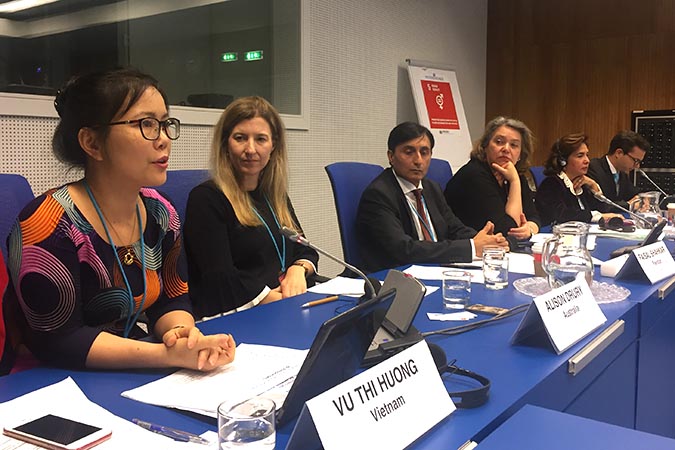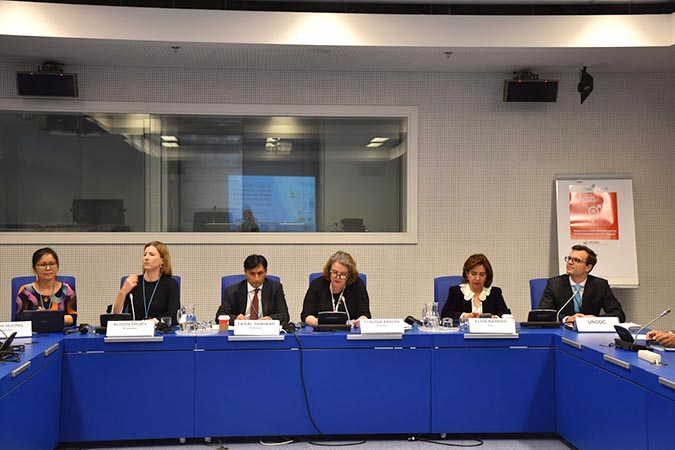UN Joint Global Programme calls for coordinated, multi-sectoral responses for survivors of violence
Date:

With at least one in three women worldwide experiencing intimate partner violence or sexual violence perpetrated by a non-partner, violence against women and girls is a persistent problem. Ending violence against women and girls is a priority and a specific target of the Sustainable Development Goals and realizing this goal is critical for the success of many other goals and targets of the visionary 2030 Agenda for Sustainable Development, ranging from health and education to decent work and economic growth.
At the 27th session of the Commission on Crime Prevention and Criminal Justice, which took place in Vienna from 14-18 May 2018, UNODC, UN Women, UNFPA, UNDP and WHO organized a side event on coordinated, multi-sectoral responses to such violence, together with the Permanent Missions of Australia, Peru and Vietnam. The UN agencies presented an overview of the “UN Joint Programme on Essential Services for Women and Girls subject to violence”, which is providing guidance to 10 countries on how to implement quality multi-sectoral services and responses that meet international standards and puts survivors’ interest at the heart of responses.
Speaking on behalf of the five participating UN entities, Claudia Baroni, Crime Prevention and Criminal Justice Officer at UNODC, said, “this Joint Programme seeks to bridge the gap between the agreements made at the international level concerning responses to violence against women and services for survivors, and their implementation at the country level.”
The ‘Essential Services Package for Women and Girls Subject to Violence: Core Elements and Quality Guidelines’, the main policy guidance developed as part of the Joint Programme, provides a series of ‘essential actions’ to be taken by State health, social services, police and justice sectors. It also offers guidance on coordination between these sectors, an often-neglected component in service delivery. These services should, at a minimum, secure the rights, safety and dignity of every woman and girl who has experienced violence.

Selected panellists, from the countries where the Essential Services Package is being piloted, outlined their respective Governments’ efforts to introduce new laws and policies and shared good practices with regards to provision of essential services for women and girls.
Faisal Shahkar, Additional Inspector General of Police from Punjab, Pakistan, said, “We are developing a mechanism in all the provinces of Pakistan and with the coordination of the federal Government, we will promote the efforts to address violence against women in the whole country."
“The number of victims of domestic violence have increased in recent years,” said Vu Thi Huong, Deputy Director of the National Legal Aid Agency of Viet Nam. “We have been facing some challenges in terms of lack of awareness, capacity and the quality of services for women and girls. That is why we need both national and international cooperation.”.
“Acts of violence continue and further increase every day, and that is part of the patriarchal culture,” added Elvia Barrios, Judge of the Supreme Court of Peru and responsible for the Gender Justice Commission on the Judiciary. “We can have the best normative frameworks, but as long as real measures are not implemented, we will not be able to eradicate violence against women”. Alison Drury, Deputy Head of Mission from the Permanent Mission of Australia, stressed the importance of supporting women and girls who are subjected to violence. Australia, alongside Spain, and the Autonomous Governments of Catalonia and the Basque Country, have been generously supporting the joint UN Essential Services Programme.
Currently, the Joint Programme is supporting the piloting of the Essential Services Package in the Asia-Pacific, Arab States, Africa and LAC regions, with a view to reaching international consensus on an agreed package of essential services for women and girls who have experienced violence, as well as advocating for their global rollout.